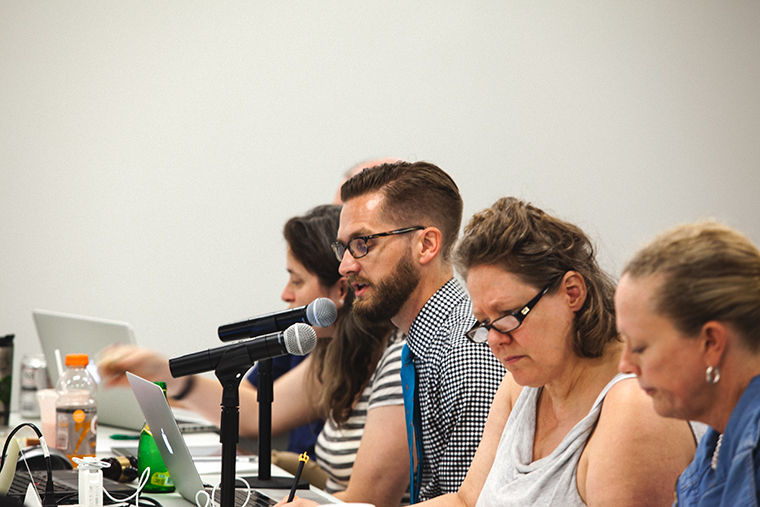Faculty Senate addresses concerns about class registration
Gregory Foster-Rice, president of Faculty Senate and associate professor in the Photography Department, speaks with senators to discuss the budget, class enrollment and other faculty concerns.
September 14, 2015
Faculty members voiced frustrations about the timing of class cancellations and stressed the need for an earlier registration period during the Faculty Senate’s Sept. 11 meeting.
“It is definitely one of the many things, process-wise, that we need to fix here,” said Stan Wearden, senior vice president and provost.
Many faculty senators said the college must create a better timetable for registration, so when their classes are changed, faculty have more time to prepare—especially important to adjunct professors, who have their income cut because of last-minute course cancellations.
Joan Giroux, parliamentarian of Faculty Senate and an associate professor in the Art + Design Department, said she worries that students do not have enough time to find a replacement class, affecting their graduation path.
“I do think it would be great if we could establish a clear calendar that is fairly set,” Giroux said.
Starting in the Fall 2017 Semester, the college will not allow students to register late, Wearden said.
“Having taught for many years myself, and having been a victim of course changes, I understand the frustration,” Wearden said.
Wearden attributed the problem to the college’s lack of a differentiated registration process. Many students are not educated clearly on the differences between early registration, priority registration or any of the other registration processes that differ from normal registration.
He added that the college needs to improve at reaching out to students who do not register on time and help them through the process, whether the problem is financial or academic.
During the summer, the Office of Student Financial Services worked with students regarding financial holds. The office employees spent hours calling students to discuss financial plans. An initial 1,000 students with financial holds dropped to fewer than 100 because of the efforts put forth by the office, Wearden said.
Other senators said they were frustrated with the registration software, limiting the college to one-size-fits-all-registration practices. Wearden said the college is investigating new software to invest in.
Sharon Zurek, a senior lecturer in the Cinema Art + Science Department, said she had two advanced classes of eight students increase to 12 each. For her classes’ final projects, students partner with a director, but she only has seven directors to 12 students.
“When we add seats, we need to understand just how many the room will fill, [and] what our curriculum promises to the students,” Zurek said.
Eric Scholl, associate chair of the Television Department, suggested implementing a system that could detect the difference between students who have not registered because of financial holds and the ones who have not registered at all.
Wearden also discussed the recent budget cuts— as reported in the article on Page 3—comparing the process to fiction writing.
“You make some kind of a fictional projection of what the enrollment is going to be and hope that projection is going to be accurate, but our models for predicting haven’t been strong,” Wearden said. “We are getting better at that now. I think we will get better about making an accurate projection in the first place so we don’t have to come back and do these fall cuts.”








